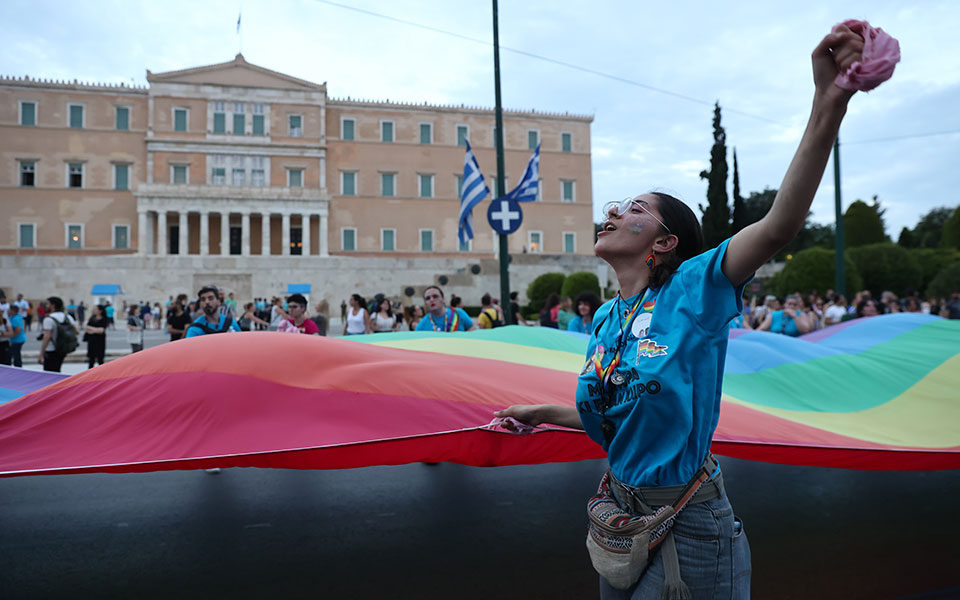By Dimitris Kouvaras,
Picture the following scenario: A mother is gravely ill, say of late-stage cancer, and is not expected to live for much longer. She is lesbian, so she is unmarried to her partner, with whom they raise her child, because the law doesn’t account for same-sex marriage. When se dies, her partner, albeit being her de facto spouse, will have no rights on the kid, whose care will be undertaken by an orphanage or a similar institution under state jurisdiction, since her actual role as a guardian is legally shrouded. But what of the child’s own right to a family and parental care? Almost immediately, the above scenario begs the question: shouldn’t the state legalise same-sex unions to vouch for the hitherto neglected rights of such children?
This was pretty much the example invoked by Greek Prime Minister, Kyriakos Mitsotakis in a recent scheduled interview of his, as a defence of a bill regarding same-sex union and adoption, which the government is expected to submit to parliament soon, at least if everything goes according to plan. If the bill were enacted as a law, it would revolutionise the country’s landscape of LGBTQ+ rights, representing a drastic improvement to the current possibility of same-sex civil unions. However, its no time to party yet, since the bill has divided opinion and highlighted the presence of reactionary elements in Greek society, not least within the very governmental party. What’s more, its reception by political leaders, and possibly the prime minister’s own stance, point to the septicaemic weaknesses of the current political landscape, including the frailty of intraparty ideological cohesion, as well as the tooling of important human rights issues for superficial political impression games, and gains.

However, before any further analysis on that, let’s have a look at what the bill includes, and what its formulation reveals about the concerns aired against it. From the start, Mr Mitsotakis rushed to highlight two key points that he deemed would be the utmost red lines of those battling the bill, even within the party, and whose exception from the proposal he thinks could provide some damage control towards the sustainability of his relations with the church and of his ideological profile. First, the marriage in question is, obviously, political, so the state does not meddle with the church’s own spiritual and procedural realm. Instead, all it does is to exercise its prerogative to legislate, whose incompatibility with the church was stressed. The message was clear: give credit where credit is due. Regarding the second point, there is no clause legalising the use of a surrogate mother by same-sex couples, which limits the possibilities of family creation to adoption. This differentiates the government from the opposition leader, Mr Kasselakis, who has spoken publicly in favour of that solution, while making the proposal seem less radical in the eyes of conservatives. Here’s the other message: we’re just following what others in Europe have done; no legerdemain with new childbirth practices.
Despite these mitigations, the bill largely remains a groundbreaking deal for Greek standards. Civil unions for same-sex couples were enacted only in 2015, while it took until 1983, and an impactful radical reform in Family Law by the then centre-left government of PASOK, to legislatively ensure gender equality in practice within (heterosexual) families. Despite the progress made during the last few years, which saw acceptance rates towards homosexual relationships and gender self-identification rising, society remains divided almost in half on the issues concerning the bill. Age has been shown to matter in shaping social beliefs, as most people under 30 years old, and especially the youth, stand in favour of the reform, having grown in an environment where LGBTQ+ issues are visible and normalised. However, this is not the case for older people, who don’t watch Netflix or understand the Pride. Admittedly, homosexuality has only recently begun to find its place in Greek media and television in a way that eschews stereotypical representation and touches on the pressing issues of discrimination and acceptance.
The greatest concern, though, is about adoption. Greek society has come to acknowledge same-sex relationships as an undeniable part of contemporary social reality, however distressful they appear to some, but it seems reluctant to do the same with same-sex families with children. The mother-father dualism is so deeply engraved in the social unconscious, as a natural phenomenon, that renders any alternate family structure inconceivable, and thus terrifying. Concerns have centred on the problematics of parental roles’ confusion and its supposed destabilising effect on children’s psychological well-being and social balances. This is an argument widely propagated by the church, which firmly opposes the bill and wields considerable influence on the religious or conservative parts of the population. Some more progressive clergymen, such as the archbishop of Crete, have shown acceptance towards homosexuality, yet even for them it is difficult to escape an essentialist thinking regarding gender-oriented parental norms, and the way human relationships work in general. Among conservatives, a flux of opinion is observed between endorsing the new and defending the old yet veering towards the second as a pillar of social stability and tradition. What differs is where the limit of tolerance is set by each agent.

Let’s move on to the political scene. The bill has fostered an ideological division within the government party, whose conservative right wing wishes to undermine the reform, by provocatively opposing it, including the Minister of State and a former Prime Minister. This begs the question of governmental cohesion and responsibility, since dissenting voices must be controlled. Mr Mitsotakis, perhaps fearing intraparty agitation, has decided not to impose a disciplined vote, prompting instead his MPs to vote based on their conscience, while implying that abstention would be a “dignified option”.
This move has triggered reactions from the parties of the centre-left, which interpret it as a sign of insufficient determination and of Realpolitik’s overshadowing honest commitment to human rights. SYRIZA’s new and contested opposition leader Mr Kasselakis -a married gay man himself- will go for a disciplined vote, surprising his own MPs who consider it an unnecessary move of impression-making. Centre-left PASOK, on the other hand, tries to pave a distinct line of argumentation, pointing to the limitations set by the adoption clause as compromising. The debate is heated and is expected to escalate when the full document is submitted for parliamentary discussion. Still, there is a common premise in the air: each player must try to create an original line of argumentation, undermine the cohesion of the competition, and gain as much potential votes as possible. The ride is wild. Even wilder considering the three parties further to the right of New Democracy, which call for a referendum or even new elections against what in their eyes is an abominable bill.
The parliamentary battle has just begun, and it cannot but be interesting to see. If you ask me, the Prime Minister has played his cards well, balancing between doing too little and going too far, and embarking on an intraparty persuasion campaign. But if you ask me again, I will say that, in my eyes, it matters little what strategy he or any other political leader follows when compared to something else: a scenario that I picture and I want you to picture too; not a sad, like the one on his interview, but a happy one. Two men -or women- walking side by side affectionately holding hands; two rings in their hands sparkling in the light; a child whose little hand is holding one of the fathers -or mothers. No fear, no shame, no worries. Just laughter, some teasing, and love…
References
- Euronews, “Greece’s government set to legalise same-sex marriage with the backing of the opposition”. Available here
- The Guardian, “Greek PM faces fierce opposition over pledge to legalise gay marriage”. Available here
- Reuters, “Greece drafts bill to legalise same-sex marriage -PM says”. Available here




